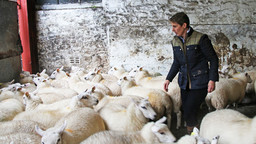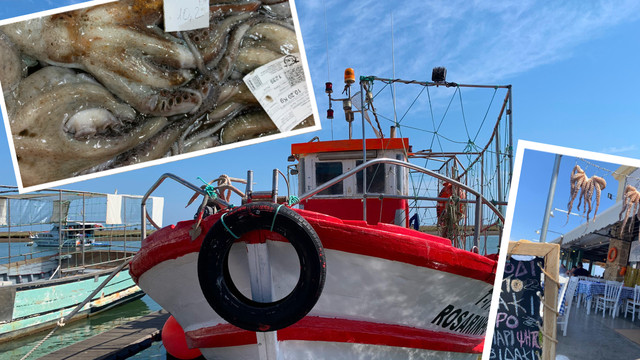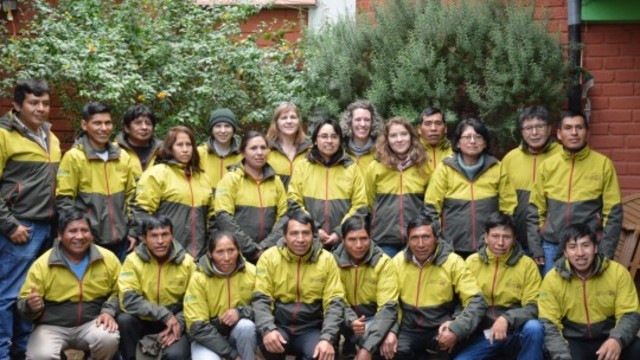Understanding the role of small farms in Europe (SALSA)
IIED and partners are working to better understand why small farms matter not just in Africa but in Europe’s own countryside.

A small farm near the Scottish town of Crief (Photo: Alejandro Guarin/IIED)
Small-scale farming is crucial for producing food and for sustaining the livelihoods of millions of people in developing countries. But small farms are also very common across Europe, where they also play an important part in providing good food, income and opportunities for people in rural areas.
However, small farms – and the small businesses that are often associated with them – are very often under the radar of research and the big discussions about agricultural policy in the European Union (EU).
SALSA (Small farms, small food businesses and sustainable food and nutrition security) is a research project, funded by the European Commission, that aims to shed some light on this often-neglected aspect of the European food system.
How prevalent are small farms in Europe, and what do they produce? How important are small farms and small food businesses to the food systems in their regions? What is the outlook of small-scale farming in a changing world, and what are the policy options for supporting it? These are some of the question that SALSA aims to answer.
The approach: multi-country and multi-disciplinary
The SALSA team, comprising a consortium of 17 European and African institutions including universities, research institutions and civil society organisations, reflects the diversity of small farms and the regions in which they are found. SALSA is collecting data from 25 European (image) and five African regions, ranging from the Scottish highlands to the Greek islands and the Kenyan plains.
In each region we are looking at small farms from two different perspectives. First, we are understanding how the regional food system works: what is produced and consumed, and who are the main actors in the system.
We are quantifying production and estimating how much of it is produced by small farms. We are understanding how policies and markets shape the system and affect small farms and food businesses, and addressing these questions by reviewing available data, talking to experts and other stakeholders, and analysing satellite imagery.
Second, we are looking at small farms and small food businesses from the point of view of the farm and business households themselves. Using 40-50 surveys in each region, we will get a detailed sense of how farms and businesses operate, what their histories are, and what challenges they face.
Bringing together the food systems analysis and the household-level data, we will then work with stakeholders to analyse the future of small farms under different scenarios, and propose policies that can support small-scale farming and small food businesses in a changing context.
Promoting EU-Africa dialogue
SALSA is mainly a European project, but Africa plays an important part as well. Small-scale farming is the dominant form of food production in the African continent and has been a central part of development research and policy in recent decades.
By including five African regions in a European comparative analysis, and by involving our African partners in the project, SALSA hopes to look at the common challenges of small-scale farming across very different contexts, and promote mutual learning between the European and African counterparts.
What IIED is doing
Unlike most of the other SALSA partners, IIED isn't conducting fieldwork in one of the selected regions. Instead, IIED is working closely with the project leadership on different aspects of the project’s overall design and implementation.
IIED has played a key role in developing the research methodologies – including the questionnaires and data-gathering tools – and in conducting the comparative analysis of the data.
Over the next three years, IIED will also contribute to the foresight analysis on the future of small farming, and use its experience in and knowledge of Africa to help synthesise the insights between the African and European regions.
News and updates
Additional resources
Unseen food: the importance of extra-market small farm’s production for rural households in Europe, Teresa Pinto-Correia, María Rivera, Alejandro Guarín, Mikelis Grivins, Talis Tisenkopfs, Paola A. Hernández (2021) Global Food Security, 30, 100563
Assessing the role of small farms in regional food systems in Europe: evidence from a comparative study, María Rivera, Alejandro Guarín, Teresa Pinto-Correia, et al (2020), Global Food Security 26, 100417
A new typology of small farms in Europe, Alejandro Guarín, María Rivera, Teresa Pinto-Correia, Nuno Guiomar, Sandra Šūmane, Olga M. Moreno-Pérez (2020), Global Food Security, Volume 26
Partners
RURALIS – Institute for Rural and Regional Research
University of Agriculture in Krakow
Technical University of Valencia (UPV)
Agricultural University of Athens (AUA)
Universidade de Cabo Verde (Uni-CV)
University for Development Studies (UDS)
African Centre for Technology Studies (ACTS)
Highclere Consulting
Savanah Young Farmers Network
African Women in Agricultural Research and Development (ICRAF AWARD)
UN Food and Agriculture Organization, Research and Extension Unit




